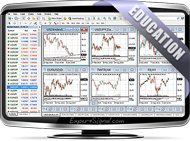
The Standard & Poor’s 500 (S&P 500)
The Standard & Poor’s 500, or S&P 500, is a float-adjusted, capitalization-weighted index comprising 500 large-cap U.S. companies listed on the NYSE or NASDAQ.
-
Established in 1957, the S&P 500 is maintained by S&P Dow Jones Indices.
-
It is a free-float weighted, capitalization-weighted index.
-
The S&P 500 covers approximately 80% of the available U.S. market capitalization.
-
Companies included in the index are publicly listed on either the New York Stock Exchange or NASDAQ.
-
As of mid-2021, the nine largest companies accounted for 28.1% of the total market capitalization.
-
A committee selects the companies included in the S&P 500 based on specific requirements (listed below).
-
Related indices include the S&P Global 100, S&P Global 1200, S&P International 700, and the S&P/TSX 60 Index.
-
Common ticker symbols are $SPX, US500, GSPC, and INX.
The Short-History of S&P 500
In 1923, the Standard Statistics Company began rating mortgage bonds. Later, in 1926, they created a 90-stock index. In 1941, Standard Statistics merged with Poor’s Publishing to form Standard & Poor’s.
-
On March 4, 1957, the index was renamed the S&P 500 Stock Composite Index, expanding to track 500 companies.
-
On April 21, 1982, the CME began trading futures based on the S&P 500.
-
On July 1, 1983, the CME started trading options based on the S&P 500.
Chart: S&P 500 yearly chart
S&P 500 Composition
Criteria/Requirements for Inclusion in the S&P 500 Index
-
The company must be based in the United States.
-
It must be publicly listed on either the New York Stock Exchange or NASDAQ.
-
The market capitalization should exceed 14.6 billion USD.
-
The minimum average monthly trading volume must be more than 250,000 shares.
-
The annual dollar value traded, based on float-adjusted market capitalization, should be greater than 1.0 (unit implied).
-
Since 2017, companies with dual share classes are not eligible for inclusion in the index.
Top-25 S&P 500 Components
This is a list of the 25 largest companies listed in the S&P 500.
| A/A | LISTED-COMPANY | SYMBOL | WEIGHT(%) |
| 1 | Apple Inc. | AAPL | 6.63 |
| 2 | Microsoft Corporation | MSFT | 6.03 |
| 3 | Amazon.com Inc. | AMZN | 3.01 |
| 4 | Alphabet Inc. Class A | GOOGL | 2.12 |
| 5 | Alphabet Inc. Class C | GOOG | 1.96 |
| 6 | Tesla Inc | TSLA | 1.88 |
| 7 | Berkshire Hathaway Inc. Class B | BRK.B | 1.53 |
| 8 | Johnson & Johnson | JNJ | 1.46 |
| 9 | UnitedHealth Group Incorporated | UNH | 1.44 |
| 10 | NVIDIA Corporation | NVDA | 1.29 |
| 11 | Meta Platforms Inc. Class A | META | 1.18 |
| 12 | Exxon Mobil Corporation | XOM | 1.14 |
| 13 | Procter & Gamble Company | PG | 1.05 |
| 14 | JPMorgan Chase & Co. | JPM | 1.04 |
| 15 | Visa Inc. Class A | V | 1.02 |
| 16 | Home Depot Inc. | HD | 0.89 |
| 17 | Pfizer Inc. | PFE | 0.89 |
| 18 | Chevron Corporation | CVX | 0.88 |
| 19 | Mastercard Incorporated Class A | MA | 0.86 |
| 20 | AbbVie Inc. | ABBV | 0.82 |
| 21 | Eli Lilly and Company | LLY | 0.79 |
| 22 | Coca-Cola Company | KO | 0.75 |
| 23 | Merck & Co. Inc. | MRK | 0.73 |
| 24 | PepsiCo Inc. | PEP | 0.70 |
| 25 | Bank of America Corp | BAC | 0.70 |
| TOTAL WEIGHT: | 40.76% | ||
The S&P 500
ExpertSignal.com (c) 2022
MORE ON ExpertSignal
| ■ ACCOUNTS | » CFD Trading Accounts | ||||
| ■ TRADING SYSTEMS | » EA Builder | » StrategyQuant (Algo) | » 1000pip Climber | ||
| ■ FUNDAMENTALS | » Exploring Fundamentals | ||||
| ■ STOCKMARKET INDICES |
» S&P 500 |
» DAX-40 |





